Key takeaways:
- Coral reefs are vital for marine biodiversity, supporting about 25% of all marine life and providing natural protection against coastal erosion and storms.
- Human activities like pollution, overfishing, and climate change significantly threaten coral ecosystems, leading to issues like coral bleaching.
- Building community awareness and engaging in conservation activities, such as beach cleanups and educational workshops, are essential for fostering a sense of responsibility towards ocean protection.
- Future goals for coral protection include advocating for stronger policies, empowering local communities, and employing innovative restoration techniques to revive damaged coral habitats.
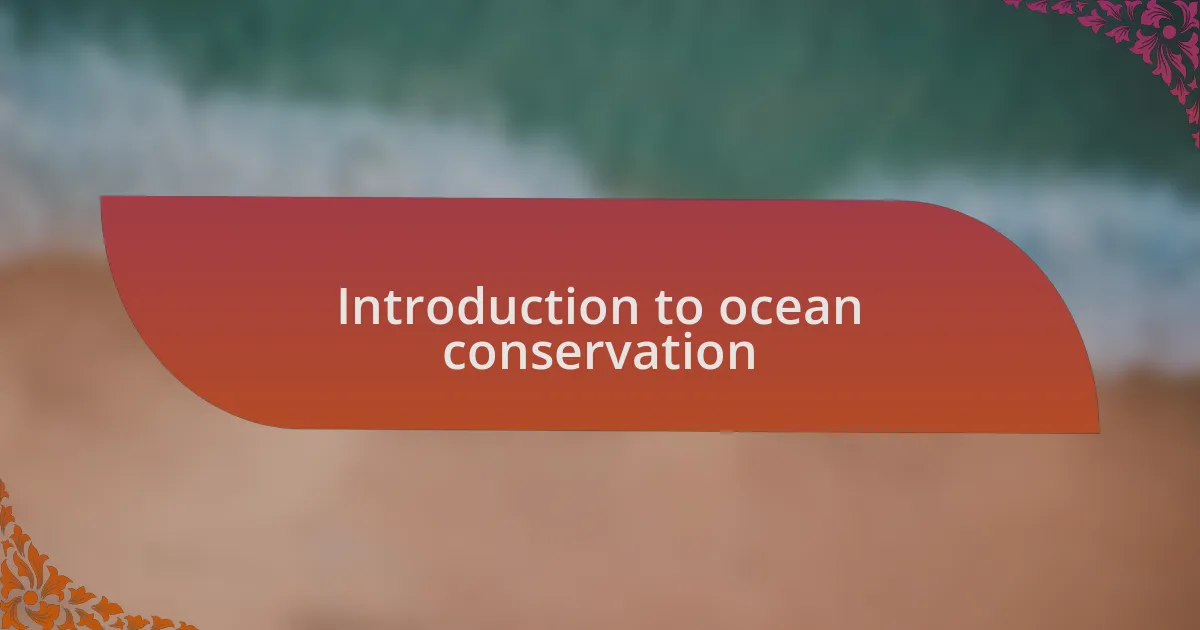
Introduction to ocean conservation
Ocean conservation is a pressing issue that affects not only marine life but also our own well-being. I remember the first time I snorkeled above a vibrant coral reef; the sheer beauty and diversity left me in awe. It struck me then, how these delicate ecosystems are not just part of the ocean but are essential to the health of our planet.
As I delved deeper into the topic, I began to realize the profound impact humans have on our oceans. Have you ever considered how plastic waste, overfishing, and climate change are silently suffocating these underwater wonders? It’s a troubling thought, but understanding this connection between our actions and the health of the ocean made me more passionate about advocating for conservation efforts.
In my journey, I’ve met countless individuals who share this commitment, each adding their unique perspective to the conversation. From scientists to local fishermen, everyone has a story that reveals the urgency of protecting our oceans. Every interaction has fueled my drive to spread awareness about the vital importance of ocean conservation, encouraging all of us to be caretakers of this magnificent blue planet.
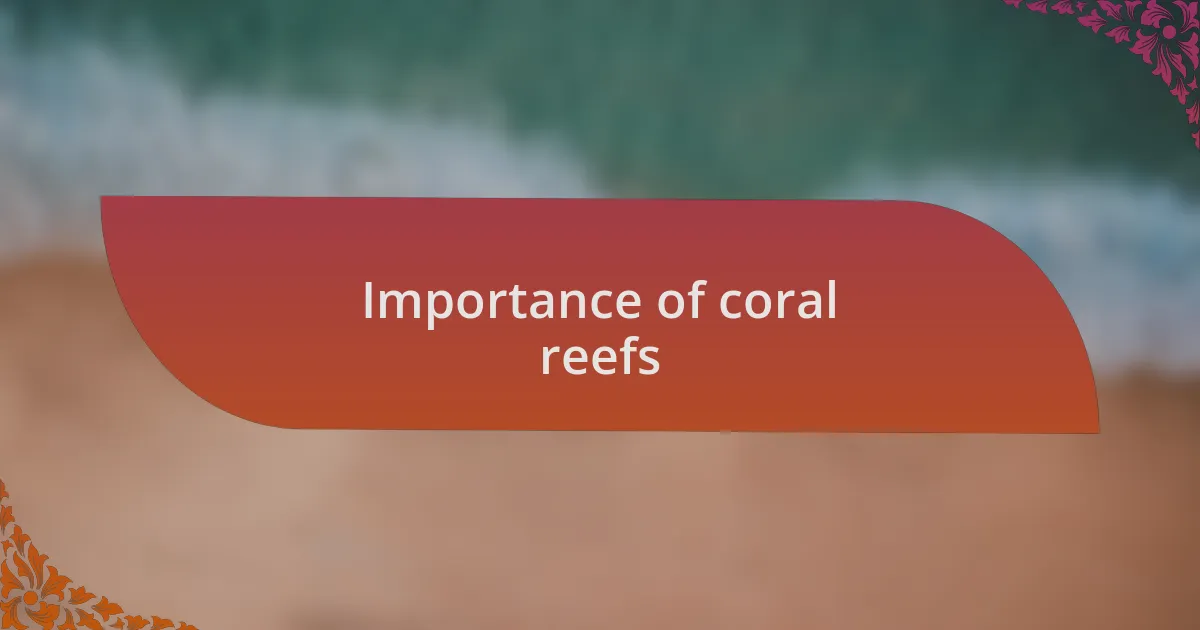
Importance of coral reefs
Coral reefs are often dubbed the rainforests of the sea, not just for their breathtaking beauty but also for the richness of life they support. When I swam alongside schools of fish darting between the corals, it struck me just how much these ecosystems serve as habitats for countless marine species. Did you know that about 25% of all marine life relies on coral reefs at some stage of their lifecycle? Their existence is crucial for biodiversity, and losing them would mean the loss of immense ecological wealth.
Beyond supporting marine life, coral reefs play a significant role in protecting coastlines from erosion and storm damage. I vividly remember listening to a local community leader discuss how the reefs acted as natural breakwaters during intense storms, safeguarding homes and livelihoods. Isn’t it incredible to think that these stunning structures serve as a buffer against nature’s fury, offering a level of protection that man-made solutions cannot replicate?
Moreover, coral reefs contribute to the economy through tourism and fishing industries, touching lives far beyond the ocean. I met a dive shop owner who shared how the vibrant reefs draw travelers from around the world, creating jobs and opportunities for his community. Can you imagine the ripple effect this has? By advocating for coral reef conservation, we are investing in sustainable futures not only for marine ecosystems but for human communities as well.
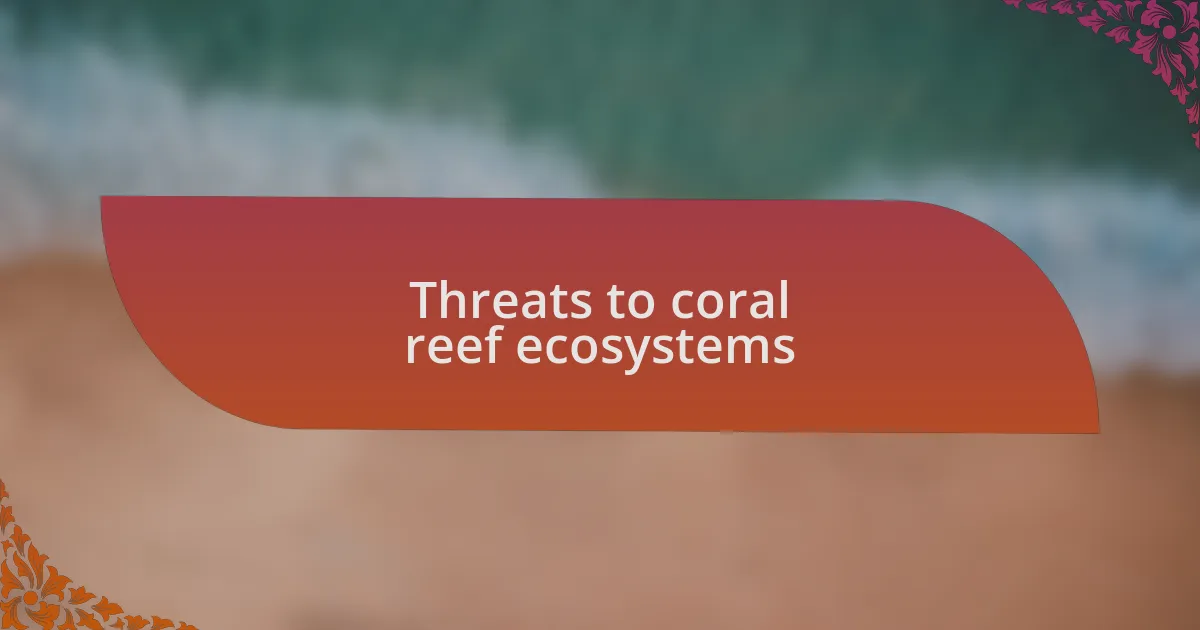
Threats to coral reef ecosystems
Coral reefs face a multitude of threats, each intricately linked to human activity. One of the most pressing challenges is climate change, which leads to coral bleaching—an alarming phenomenon I witnessed firsthand during a recent dive trip. It was heartbreaking to see vibrant corals transformed into ghostly white structures, stripped of their color and vitality. How can we stand by while these breathtaking underwater gardens are at risk?
Overfishing and destructive fishing practices pose another significant danger. I remember chatting with a marine biologist who shared stories of local fishermen using harmful techniques that not only deplete fish populations but also damage the reef ecosystem itself. Isn’t it disheartening to think that our desire for immediate gains could jeopardize the future of these rich habitats?
Additionally, pollution from land runoff significantly impacts coral health. During a snorkeling excursion, I observed plastic waste entangled in corals, a sight that left me feeling frustrated and helpless. It made me wonder: what kind of legacy are we leaving for future generations if we continue to disrespect these beautiful ecosystems? Every action counts, and the urgency to protect our coral reefs has never been more critical.
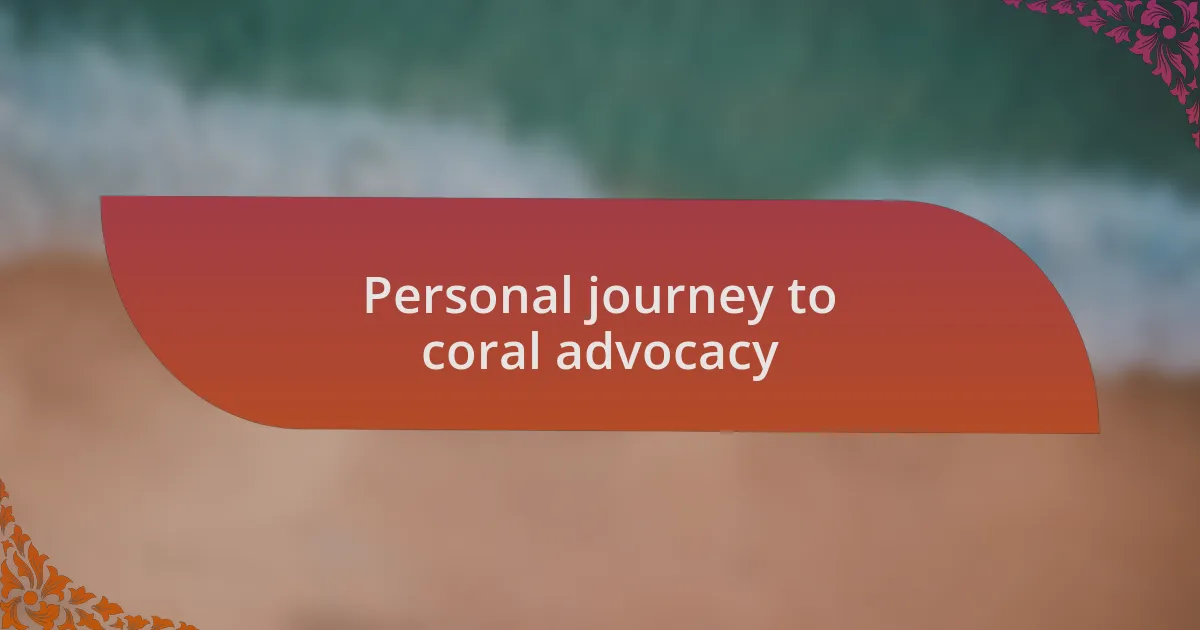
Personal journey to coral advocacy
The moment I stepped into the warm waters of the Caribbean for the first time, I was captivated by the underwater world. Swimming alongside schools of fish and vibrant corals sparked something deep within me. That experience ignited my passion for the oceans, but it was witnessing the devastating impact of pollution that transformed my fascination into a fervent advocacy. How could I enjoy such beauty and not fight for its survival?
There was a turning point during a beach cleanup I organized with local volunteers. As we picked up trash, I found myself overwhelmed by the sheer volume of debris, especially plastic. The realization hit me—this was not just about cleaning a beach; it was about saving the coral reefs that depend on healthy, thriving environments. I questioned what kind of difference we could make if everyone took just a small step toward caring for our oceans.
Diving deeper into coral advocacy, I began educating myself about reef conservation strategies. It was a journey filled with ups and downs, yet each piece of knowledge felt empowering. Collaborating with like-minded advocates reinforced my belief that collective efforts could indeed restore these precious ecosystems. Have you ever felt that spark of determination to make a change? For me, that spark has grown into a relentless commitment to our oceans and their fragile corals.
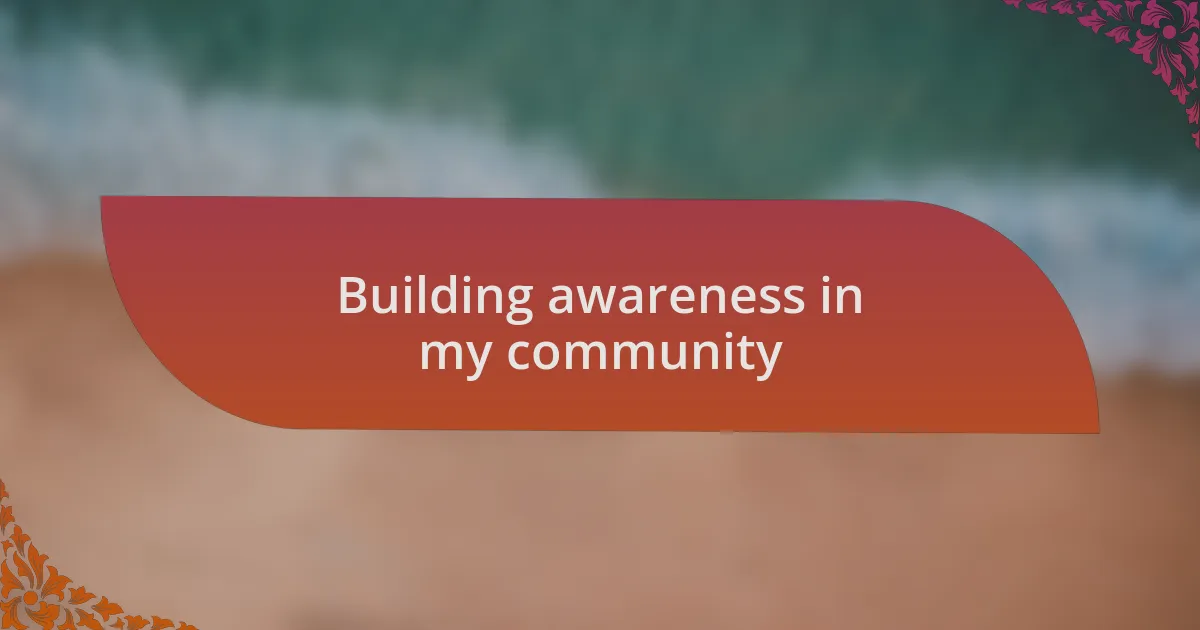
Building awareness in my community
The journey of building awareness in my community began with simple conversations. At local gatherings, I would share my experiences, showing friends and neighbors photos of coral reefs and the wonders they harbor. I remember one evening at a potluck where a friend asked, “How can we help?” That question opened the door for deeper discussions and motivated me to organize more events.
I started hosting talks at the community center, inviting ocean experts to share their knowledge. One unforgettable moment was when a marine biologist brought a piece of coral for everyone to see. The awe on people’s faces as they learned about the reef’s fragility was palpable. It was then I realized that tangible experiences could shift perspectives; simply hearing about coral wasn’t enough—people needed to feel a connection.
To further engage my community, I launched a social media campaign that highlighted coral advocacy projects, from local reef monitoring to beach cleanups. Each post came with a personal touch, showcasing my journey alongside compelling statistics about coral decline. I often wondered, “How many more people could we inspire if they saw the beauty and struggle of our oceans?” It was moments like these that reminded me that awareness can spark action, one person at a time.
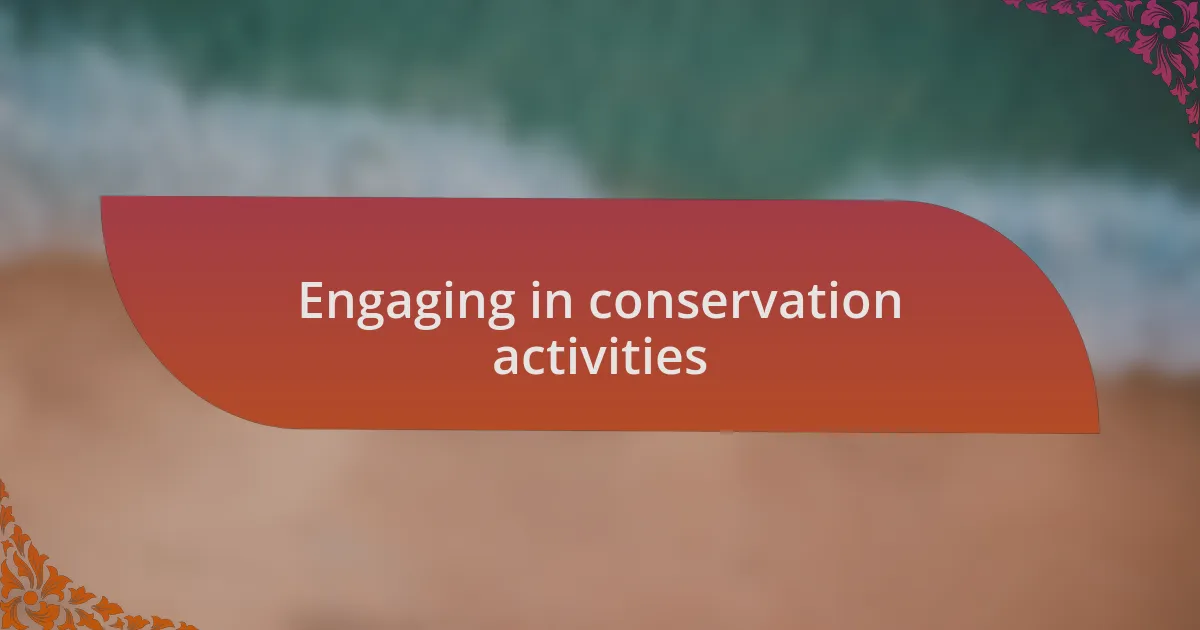
Engaging in conservation activities
Engaging in conservation activities truly began when I decided to step beyond talking and dive into action. I remember that exhilarating feeling I had during my first beach cleanup. Armed with a reusable bag and a few friends, we gathered not only plastic but stories from fellow beachgoers who loved the ocean as much as I did. Each piece of trash we picked up felt like a small victory for the reefs we were trying to protect.
One of my more transformative experiences was participating in a coral restoration workshop. As we carefully transplanted coral fragments onto an artificial reef, I felt a profound sense of hope. I couldn’t help but ask myself, “What if more people could experience this sense of purpose?” Being hands-on with the restoration effort ignited an urgency within me—getting involved was the key to making a tangible impact.
I’ve also discovered that engaging young minds in conservation activities can be incredibly rewarding. Recently, I volunteered at a local school, helping kids create art inspired by coral reefs. Watching their faces light up as they learned about the importance of coral ecosystems left me asking, “How can we nurture this sense of wonder?” It affirmed my belief that by engaging the next generation, we can cultivate lifelong advocates for our oceans.
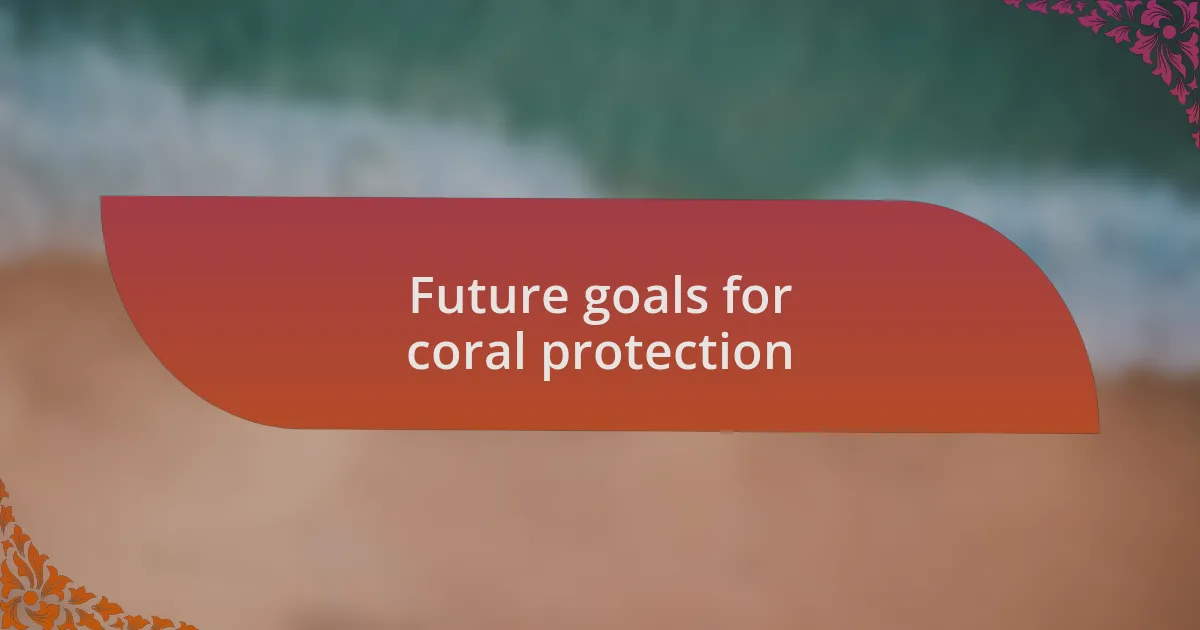
Future goals for coral protection
One of my primary future goals for coral protection is to advocate for more robust policies that address the root causes of coral decline, such as climate change and pollution. I believe that effective legislation can create a safety net for vulnerable coral reefs. Reflecting on my own experiences, I often wonder, “How many ecosystems could be saved simply by making our voices heard?”
Moreover, I am eager to support educational programs that empower communities to take action for their local reefs. During a recent workshop I led, I watched as participants transformed their newfound knowledge into projects that would benefit reef ecosystems. It struck me: what if every community took ownership of their coral environments? It’s a lofty aspiration, but I see it as pivotal for sustainable conservation.
Lastly, my vision includes the restoration of damaged coral habitats through innovative techniques like coral farming. I recall the joy I felt while collaborating with experts in that field; it reinforced my belief in using science-driven solutions. How exciting would it be if restoration efforts could pave the way for a resurgence of coral populations? Embracing these goals not only keeps the hope alive but also turns the tide for coral health globally.